 Career counseling sessions" width="300" height="150" />
Career counseling sessions" width="300" height="150" /> Career counseling sessions" width="300" height="150" />
Career counseling sessions" width="300" height="150" />
Throughout our lives, we are likely to be troubled with questions or experience self-doubt regarding career choices and what to do next.
We may turn to friends, family, and even colleagues for advice regarding our lack of career advancement or dissatisfaction regarding our current career path (Nathan & Hill, 2006).
Dedicated career counselors are available and provide professional advice on career decisions, coping with change, job searching, and identifying learning opportunities (Niles & Harris-Bowlsbey, 2017).
This article introduces resources to help career counselors provide the necessary career interventions to help clients find that path.
Before you continue, we thought you might like to download our three Strengths Exercises for free. These detailed, science-based exercises will help your clients realize their unique potential and create a life that feels energizing and authentic.
Clients engage career counselors for many reasons in a variety of situations. Each setting requires specialist support from the counselor and interventions appropriate to their clients’ needs, including (Niles & Harris-Bowlsbey, 2017):
In the following example, a corporation has engaged a career counselor to support mid-level managers facing lay-offs. The typical objectives and structure for career counseling sessions may look like the following (modified from Niles & Harris-Bowlsbey, 2017):
A summary of objectives for employees soon to be terminated may include helping them:
The following example session plan supports these objectives:
The overview above is one of many possible sets of intervention sessions. Each must be made individual and specific to the situation and client (both employer and employee).

The following are valuable interventions for increasing counselors’ understanding of the client’s needs and wishes.
While career counseling should be specific and individual to the client, assessments and interventions typically include the following five stages (modified from Nathan & Hill, 2006):
Each stage may take place over multiple sessions and should be revisited as new understandings and information arise.
Emotional support given to clients can help them feel like they matter and remain relevant to the workforce. However, this requires skill and good intention from the counselor to stay genuine and authentic (Niles & Harris-Bowlsbey, 2017).
The acronym PLEASE is a helpful aid and treatment plan for supporting clients (modified from Niles & Harris-Bowlsbey, 2017):
Dialogue should remain flexible and not prescribed. The aim is to support the client and ensure they feel they matter.
While there are several approaches to career counseling, the counselor usually begins by forming a picture of the client’s self-observations and career beliefs. The counselor develops an understanding based on the following (modified from Niles & Harris-Bowlsbey, 2017):
Early sessions in career counseling should center around understanding the client’s current situation, background, and future aspirations.
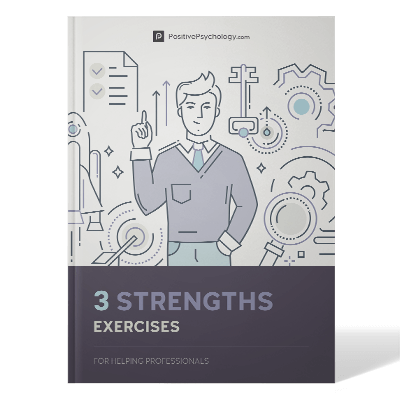
These detailed, science-based exercises will equip you or your clients with tools to discover and harness their unique strengths.
Download PDF
By filling out your name and email address below.
The following two techniques are powerful approaches to narrow down where the client is and what they want from their career.
Career counseling techniques are “more effective when they are in line with the client’s developmental stage” (Kidd, 2014, p. 22).
The framework that follows the acronym FIRST (focus, information, realism, scope, and tactics) is a helpful and practical tool for understanding the client’s existing developmental stage.
Use the FIRST Framework Questions worksheet to ask the client a series of career counseling questions to understand where they are in their career thinking; for example (modified from Kidd, 2014):
The counselor assesses the answers to understand how far the client is along the path to a new career decision.
While subjective assessments may not fully capture the skill sets and expertise of clients, they help clarify their wants and needs for current and future roles (Niles & Harris-Bowlsbey, 2017).
The Assessment of Life and Career ‘Wants’ worksheet contains five questions that help clients connect their sense of purpose to the career they wish to pursue.
The answers are valuable for considering how their existing or future career plans meet their needs and wants.

The following worksheets help to engage with clients at different stages in their careers and counseling journey.
Evaluation sheets are crucial for understanding whether clients’ needs are being met and how to improve future interventions.
Provide the client with the Career Counseling Evaluation worksheet, then review and collate the answers to identify how to improve the support provided.
Focusing on achievements is a positive way of raising self-esteem and identifying counseling skills that may be useful later in someone’s career (Nathan & Hill, 2006).
The Satisfying Achievements at Work exercise identifies key accomplishments, what was important about each one, and the skills and qualities involved (modified from Nathan & Hill, 2006).
The answers help the client and guide the counselor’s interventions to identify skills and qualities they may wish to use in future roles.
If the client has been out of the working environment for some time, perhaps with parental responsibilities or long-term sickness, a return to the workforce may prompt concerns regarding a lack of skills or relevant strengths (Niles & Harris-Bowlsbey, 2017).
Use the Returning to Work Checklist to remind clients of their many strengths and transferable skills from previous employment or in response to their duties outside.
Every person brings with them skills and strengths. The exercise above helps to remind the individual that these skills and strengths may have been developed or practiced outside the workplace.

The Positive Psychology Toolkit© is a groundbreaking practitioner resource containing over 500 science-based exercises, activities, interventions, questionnaires, and assessments created by experts using the latest positive psychology research.
Updated monthly. 100% Science-based.
“The best positive psychology resource out there!”
— Emiliya Zhivotovskaya, Flourishing Center CEO
There are typically four stages to group career counseling (modified from Niles & Harris-Bowlsbey, 2017):
Most counselors recognize group counseling as an efficient and valuable method of service delivery (Niles & Harris-Bowlsbey, 2017).
The following two activities can be helpful for individuals and groups.
Narrative therapy can work well in a group or individual setting. For example, answers to the following prompts regarding key events in a client’s life can indicate dominant themes that impact the present (modified from Kidd, 2014):
Understanding a client’s narrative can help the counselor make more informed decisions regarding future interventions.
Action plans are valuable for turning abstract wishes into concrete goals.
The Career Action Plan worksheet helps users capture goals, turning them into a series of action steps, and commit to work toward them.
Use the worksheet with the client or group within a session, discussing the importance of goals when seeking to progress or change a career (modified from Nathan & Hill, 2006).
There are many counseling books available that explore the techniques involved in career counseling; we’ve included three of our favorites below.
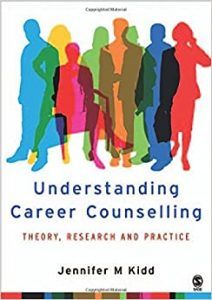 Understanding Career Counselling" width="211" height="299" />
Understanding Career Counselling" width="211" height="299" />
This practical and accessible book takes the reader through the theory, research, and practice of career guidance and career counseling.
Jennifer Kidd’s text provides an invaluable resource for established practitioners and those new to this and related fields.
Find the book on Amazon.
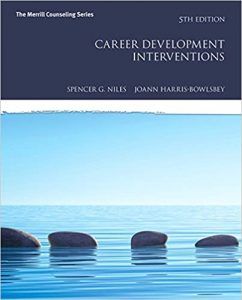
This comprehensive book on modern career development includes theories, assessments, resources, and planning tools to use with clients.
The text includes up-to-date coverage of technologies to help practitioners and clients, including social media for job seeking and to assist the interview process.
Find the book on Amazon.
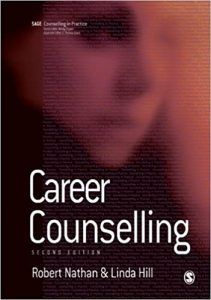
This powerful book looks at the practicalities of deciding on and securing a new career and the importance of working with and supporting client feelings.
This practical guide explores all the issues typically brought to career counseling sessions, along with many others that are less common.
Find the book on Amazon.
While not purely related to career counseling, the following apps provide valuable tools for promoting career learning, job searching, and securing new work opportunities:
![]()
This business-related social network is an excellent resource for the latest industry updates in your chosen field, as well as for finding new and existing connections and opportunities to support you in your search for a new career.
Find the app in the Google Play Store.
Find the app in the Apple App Store.

While hosting a vast job board, Monster also offers tips, tools, and coaching to assist job hunters in preparing for interviews. Along with a clear indication of salaries, this app allows users to upload resumes and pictures through their dedicated portal.
Find the app in the Google Play Store.
Find the app in the Apple App Store.

Not just a powerful app for searching for your next job, Glassdoor provides company reviews, interview tips, and salary insights.
Other highly valued features include interview reviews, interview questions, and expert tips on applying for and landing your next job.
Find the app in the Google Play Store.
Find the app in the Apple App Store.
We have many tools, worksheets, and exercises available to support you or your client on future career moves and building their role profile.
Why not download our free goal-setting tool pack and try out the powerful tools contained within to help your clients achieve their career aspirations? Here are some example exercises from the tool pack:
Other free resources include:
More extensive versions of the following tools are available with a subscription to the Positive Psychology Toolkit©, but they are described briefly below:
Step one – Map strengths to the job requirements.
Step two – Write an employment history.
Step three – Add strengths to the employment history.
Step four – Ask someone to perform a review.
Imagine running your own business and reflect on the following questions:
If you’re looking for more science-based ways to help others develop their strengths, check out this collection of 17 strengths-finding tools for practitioners. Use them to help others better understand and harness their strengths in life-enhancing ways.
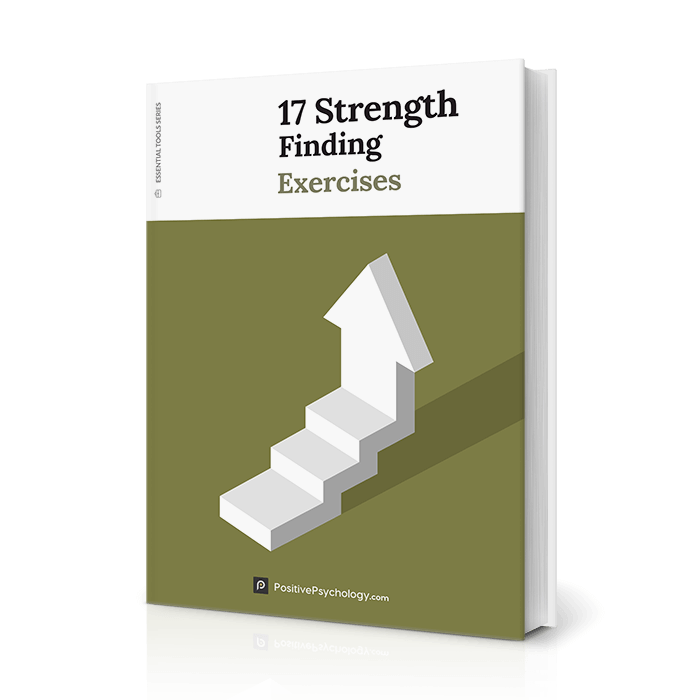
Use these 17 Strength-Finding Exercises [PDF] to help others discover and leverage their unique strengths in life, promoting enhanced performance and flourishing.
Created by Experts. 100% Science-based.
Our careers and how we see ourselves are crucial aspects of our physical and mental wellbeing, providing purpose and meaning in our daily lives.
Career counseling aims to help people achieve their potential and be more satisfied and successful in their work. As such, it remains specific to the individual’s situation, needs, and wants, with no single career path that suits everyone (Nathan & Hill, 2006).
By understanding past successes and achievements, reflecting on where the client is now, and evaluating their career aspirations, it is possible to formulate a plan for what success looks like for them.
Career counseling can also help clients accept that change is often outside their control and not a result of failing performance. Once recognized, the client can identify skills and qualities they wish to use in a future workplace and craft their career journey accordingly.
These techniques, counseling activities, and worksheets help career counselors work with their clients to change or develop a career according to their needs and wishes.
We hope you enjoyed reading this article. Don’t forget to download our three Strengths Exercises for free.
ReferencesJeremy Sutton, Ph.D., is an experienced psychologist, consultant, and coach. Jeremy also teaches psychology online at the University of Liverpool and works as a coach and educator, specialising in positive psychology, performance psychology, sports psychology, and strength-based psychology.

Share this article:
Your information written here has given me a broader insight on the subject matter as a newly appointed counselor in my school. Thanks for helping me. Reply

From a maturing body and brain to developing life skills and values, the teen years can be challenging, and mental health concerns may arise. Teens [. ]

Planning is crucial in a counseling session to ensure that time inside–and outside–therapy sessions is well spent, with the client achieving a successful outcome within [. ]

Counselors have found it challenging to settle on a single definition of their profession or agree on the best counseling methods and techniques to treat [. ]